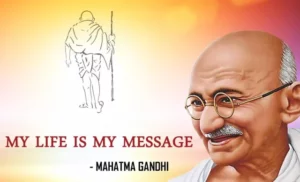Mahatma Gandhi One Liner Questions Mahatma Gandhi, also known as “Father of the Nation,” was a political leader, civil rights activist, and freedom fighter in India during the British colonial period. He played a pivotal role in India’s struggle for independence through his philosophy of nonviolent civil disobedience. Gandhi was born in 1869 in British-ruled India, in the small princely state of Porbandar. He was the youngest of three children born to Karamchand Gandhi, the chief minister of Porbandar, and his fourth wife, Putlibai. From a young age, Gandhi showed an interest in religion and spirituality.
He was a deeply religious person, and his beliefs were heavily influenced by Jainism and Hinduism. Gandhi was sent to England in 1888 to study law, but struggled to adapt to the culture and lifestyle there. However, he did graduate and returned to India in 1891 to begin practicing law. He struggled to find success as a lawyer, and in 1915 he accepted a contract to work for an Indian firm in South Africa. It was during this time that he began to develop his philosophy of nonviolent resistance and civil disobedience.
Mahatma Gandhi One Liner Questions
Gandhi returned to India in 1915, where he immediately became involved in the Indian independence movement. He quickly became a leader of the Indian National Congress, a political party that sought independence from British rule. Gandhi’s philosophy of nonviolence and civil disobedience became the foundation of the Indian independence movement. He led numerous protests and campaigns, including the Non-Cooperation Movement and the Salt March, which were successful in drawing attention to the Indian cause and putting pressure on the British government.
Gandhi’s philosophy of nonviolence was not only a political tool, but also a way of life for him. He believed that through nonviolence, individuals could achieve self-purification and create a society based on truth and justice. He also believed that nonviolence was the only way to achieve lasting peace and end conflicts. Gandhi’s leadership and philosophy of nonviolence were instrumental in India’s struggle for independence.
Mahatma Gandhi One Liner Questions
His campaigns and protests inspired people across the country to join the movement for freedom. In 1947, after years of struggle and sacrifice, India finally gained independence from British rule. Gandhi’s legacy continues to be felt in India and around the world. He is widely considered to be one of the most influential leaders of the 20th century, and his philosophy of nonviolence has been adopted by other political and social movements around the world.
Also Read :
Padma Awards 2023 | Download Full List In PDF Of Padma Awardees

He was assassinated in 1948 by a Hindu nationalist who opposed his views on religious tolerance. Gandhi’s life and teachings continue to inspire generations to strive for peace, justice, and freedom, through non-violence and civil disobedience. His philosophy of nonviolence, his emphasis on self-reliance and his leadership in the non-cooperation movement, as well as his constructive work to improve the lives of the poorest of the poor, made him one of the most respected and revered figures of the 20th century.
Mahatma Gandhi One Liner Questions
His life and message remain as relevant today as they were during his lifetime, and he will always be remembered as the “Father of the Nation” in India and a global icon of nonviolence and peaceful resistance. Mahatma Gandhi’s legacy and impact are far-reaching and still felt to this day. From the Civil Rights Movement in the United States to the anti-apartheid struggle in South Africa, his philosophy of nonviolence has been a source of inspiration for many oppressed people around the world.
His message of love, peace, and tolerance continues to be a guiding light for individuals and communities everywhere, reminding us of the power of nonviolence to effect change and bring about a more just and peaceful world.
Mahatma Gandhi One Liner Questions All Best PDFs
Download Mahatma Gandhiji Question Bank PDF
Download About Mahatma Gandhiji PDF
10 Key Points About Gandhiji PDF

